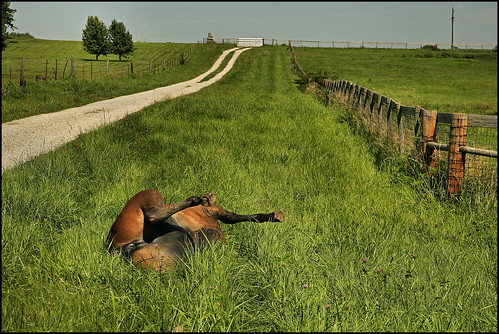I picked up Truman Capote’s In Cold Blood for the first time this weekend. I am only a hundred pages in thus far, but I can only begin to suggest how artfully he frames the narrative in the first fifty pages. I have yet to see the film starring Robert Blake, and I am kind of glad I held out because after finishing the book I would be very interested to see how they translated this narrative. The book seems almost written for the screen, the way in which it cuts between the narratives of the Clutter family and the murderers harrowing movement towards what is written as if it were the violent destiny for everyone involved in this macabre documentary tale. It is really masterful how the juxtaposition of the family’s daily routine with a more detailed portrait of violence personified by these two murderers creates a tension and compassion that is as masterful a narrative splicing as I have yet to read.
I also was struck by a few of the symbolic harbingers of things to come. One, in particular, struck me more than the other in the first fifty pages of the book -the description of Mr. Clutter admonishing his son Kenyon not to ride his horse too hard:
“Skeeter was a horse.” A beautiful horse. A strawberry stallion he [Kenyon] had raised from a foal. How that Skeeter could take a fence! “You use a horse too hard,” his father had cautioned him, “One day you’ll ride the life out of Skeeter.” And he had; while Skeeter was streaking down a road with his master astride him, his heart failed, and he stumbled and was dead.
A vivid moment that captures the immediacy of death, and how quickly it can all be turned off. A theme Capote elaborately weaves throughout the first one hundred pages so brilliantly. Yet, I had only ever seen horses as majestic, powerful beasts who move so swiftly and gracefully, and yet are somehow rooted to the earth. Being a city boy, I have never seen a dead horse, and have to admit that I didn’t really have the imaginative power to represent what it might look like. But then, as if by some metaphysical convergence, I came across the following image in FoToEdge’s Flickrstream, whose photographs constantly inspire so much emotion and thought for me, but this one was one in particular was just downright unheimlich.

And the two separate works of art all became that much more beautifully horrific for me.


Interesting stuff Jim. I am reminded of the chapter, ‘The Breeding Barn’ in that great modern American novel by Tom Wolfe, A Man In Full, which btw is even better than Bonfire of the Vanities. Sadly, Wolfe hasn’t written anything as good since.
In that chapter Wolfe graphically describes in wonderful prose the impregnation of a brood mare by the stud stallion at Charlie Croker’s beloved Turpmtime ranch. It is a brilliant evocation of sex as death in procreation. The horse doesn’t die, but the description of ‘le petit mort’ is potent:
“Suddenly the slide ended, the paroxysmal jerks ceased, and the stallion gave a sigh and a noisy groan, a cross between a snort and a whinny. A pathetic whine was what it was, compared to the mighty overture he had sung just seconds before. Then he slid back off the mare. His forelegs looked more ridiculous then ever, as they slithered back over her hide. He was finished , utterly spent. Despite his enormous size, he suddenly looked powerless… The great beast looked dead, out on his feet.”
Wow, Tony. What a beautifully framed comment that offers an excellent complement to this post. Pulling out the literary guns, I like it. To add a little bit more fuel, how about the scene from Dostoevsky’s Crime and Punishment wherein Raskolnikov dreams of watching a horse being beat to death by its owner, as he had when he was a child of seven:
A whole new can of worms Jim. Dostoevsky takes us down down down into the darkest chamber of the human psyche, and the ugly realm of the mob. Upfront I am a lefty, so my politics will color my analysis.
Dostoevsky is a subversive, an outsider if you will, and he rips away the hypocritical facade of society to its elementals: power based on property, stupidity, indifference, and moral turpitude. Three times Mikolka refers to the poor doomed beast as his “property” – he owns the creature body and soul, and he can destroy it by his capricious will alone. The bourgeois and the rest of society, the mob, are equally complicit. The innocent child aka adult nihilist Raskolnikov is the only “soul” that is outraged. The Russian aristocracy of pre-revolution Russia of course measured their wealth as the number of “souls”, serfs, they owned.
The young nihilist Bazarov, in Turgenev’s “Fathers and Sons”, is another “soul” that sees into the dark heart of society, but unlike Raskolnikov, doesn’t get a second chance and is destroyed by a banal random act of fate. Prince Myshkin, Dostoevky’s “Idiot”, another outsider, is also destroyed by society.
In my post “Film Noir’s Anti-Hero: The Outsider”, I quote from Colin Wilson’s The Outsider (1956, Gollanz, London) regarding the outsider’s perspective:
“What can be said to characterise the Outsider is a sense of strangeness, or unreality… The Outsider is a man who has awakened to chaos… Even if there seems no room for hope, truth must be told… chaos must be faced.”